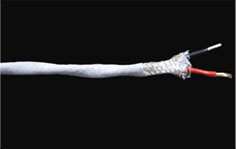| A thermocouple cable is a cable made of two dissimilar metals that enables accurate measurement of temperature and is widely used in industrial heating processes, particularly those carried out at high temperatures. It consists of two dissimilar metals, joined to form a junction, which when heated produce a thermoelectric voltage (EMF). This voltage changes as the temperature increases or decreases. The resultant EMF (Electro Motive Force) is proportional to the temperature difference between the junction and is measured and interpreted in millivolt by using the thermocouple thermometer. For connecting the thermocouples to the temperature indicators Extension and Compensating cables are used. |
 |
What are the different thermocouple types?
Thermocouples are available in different combinations of metals or calibrations which are suitable for different measuring application. Most common calibrations are J, K and T. Each calibration has a different temperature range and environment, although the maximum temperature varies with the diameter of the wire used in the thermocouple,thicker elements withstand higher temperature and have longer life. The diameter of the thermocouple has a significant effect on response time also. A smaller diameter results in a quicker response, but is less durable than a larger diameter thermocouple.
We manufacture only J, K and T type thermocouple wires under PTFE and Fiberglass Insulation.
-
J Type (Iron-Constantan) – Temp Range -ve 40°C to +ve 750°C
-
K Type (Chromel-Aluminium)– Temp Range -ve 200°C to +ve 1350°C
-
T Type (Copper-Constantan) – Temp Range -ve 200°C to +ve 350°C
Factor Determining the Type of Thermocouple to be used?
Because thermocouples measure in wide temperature ranges and can be relatively rugged, they are very often used in industry. The following criteria are used in selecting a thermocouple:
- Temperature range required,
- Abrasion and vibration resistance,
- Chemical resistance of the thermocouple or sheath material,
- Physical space limitation, method of installation and type of instrument connection desired.
- Response time i.e. the time required to reach the temperature being sensed. Response time is greatly influenced by the type of junction selected (grounded, ungrounded, and exposed).
- The environment or atmosphere that the thermocouple will be exposed to e.g. may be it is magnetic?. This is important because the metals used in thermocouple construction react differently in different environments. Metals that work well in one environment, will quickly fail in another environment at the same temperature.
Extension Cables are manufactured from conductors having the same nominal composition as well as the same emf output as those of the corresponding thermocouple. Letter ‘X’ following the designation of the thermocouple, e.g. KX, denotes these cables.They serve as an extension from the thermocouple to the measuring device. We manufactures JX, KX and TX type extension cables.
Compensating Cables are manufactured from conductors having different composition from the corresponding thermocouple but have similar emf output over a limited temperature range (generally 200°C). Letter ‘C’ following the designation of the thermocouple, e.g. ‘KC’, denotes these cables.
We manufacture RTD, Thermocouple Extension and Compensating cables with the PTFE and Fiberglass Insulation. We make following constructions commonly with parallel as well as twisted form.
- PTFE/ PTFE
- PTFE/ PTFE/ SS Braided
- PTFE/ (SPC/ NPC/ BC) Braided/ PTFE
- PTFE/ PTFE/ Fiberglass
- Fiberglass/ Fiberglass
- Fiberglass/ Fiberglass/ SS
- Fiberglass/ Fiberglass/ PTFE
We manufacture the above Insulated cables as per the requirement or specifications of the customer with insulating material PTFE and Fiberglass. We manufacture 2 Core, 3 Core, 4 Core and 6 Core RTD cables with above mentioned constructions using best quality Bare Copper, Silver Plated Copper and Nickel Plated Copper Conductors. |
